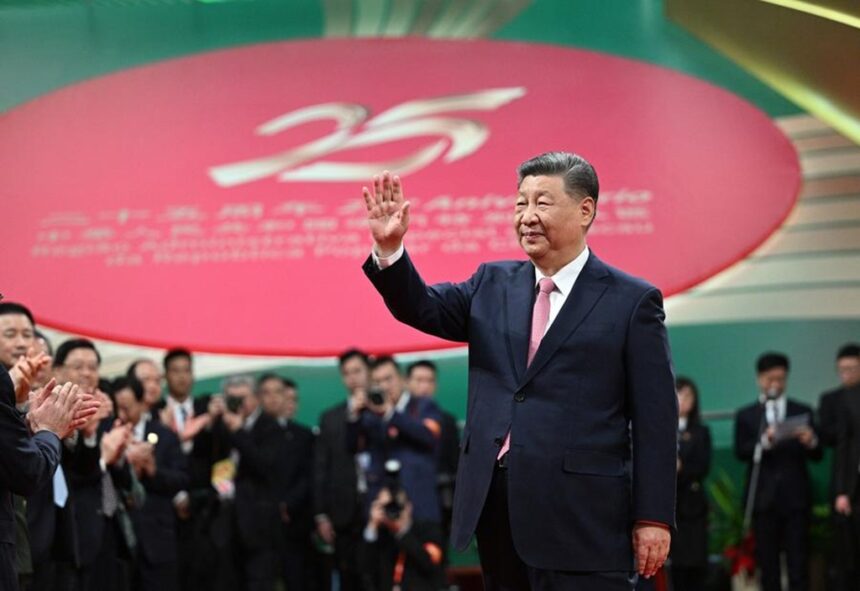Chinese President Xi Jinping emphasised the importance of maintaining the “one country, two systems” principle as Macao marks 25 years of significant transformation following its return to China.
In a televised ceremony at a prominent sports venue in Macao, Xi officially appointed Sam Hou Fai, a 62-year-old former senior judge, as the new chief executive for the sixth term of the Macao Special Administrative Region (SAR). Sam’s team of principal officials for the Special Administrative Region government took their oaths of office in a ceremony presided over by Xi.
Following the inauguration, Xi, who holds the positions of general secretary of the Communist Party of China Central Committee and chairman of the Central Military Commission, spoke to an audience exceeding 1,000 individuals.
During a recent statement, Xi emphasised that the significant accomplishments of Macao since its return serve as evidence to the global community that the “one country, two systems” framework possesses notable institutional advantages and remarkable vitality.
Macao and Hong Kong, both Special Administrative Regions of China, have been operating under the “one country, two systems” framework since China regained sovereignty over these territories, which had previously been under Portuguese and British colonial rule for extended periods. The policy enables the preservation of capitalist systems and lifestyles within the framework of socialist China.
During the ceremony held on Jan 3, 2025, Xi praised the “one country, two systems” framework tailored for Macao, declaring it a remarkable success and highlighting the significant transformation that has occurred in the region.
Macao a Global Tourists Hub
Xi emphasised the notable progress Macao has made in both economic and social development, the enhancement of the well-being of its residents, and the growth of its external cooperation efforts. A spokesperson stated that residents of Macao currently experience a broader spectrum of rights and freedoms than ever before in history.
In the year 2023, Macao’s Gross Domestic Product experienced a remarkable increase, reaching seven times the amount recorded in 1999. The nation’s per capita GDP currently stands among the highest globally.
Macao has been recognised as one of the safest locations in the world. In a significant development, education is now provided free of charge from kindergarten through senior high school. Additionally, the average life expectancy in the region has seen an increase, reaching an impressive 83.1 years.
Macao, historically known as a “casino city” due to its thriving gaming sector, is undergoing a transformation as the city actively seeks to diversify its economic landscape.
On Friday, Xi emphasised that Macao’s position has been enhanced as a global hub for tourism and leisure, serving as a commercial and trade cooperation service platform between China and Portuguese-speaking nations. He highlighted its role as a base for exchange and collaboration, where Chinese culture predominates while diverse cultures coexist.
Macao, now in its 26th year as a Special Administrative Region of China, is radiating a sense of joy and positivity. Popular sites like the Ruins of St. Paul’s are currently adorned with festive posters and floral decorations, as national flags and SAR flags flutter prominently along the streets.
“This year’s decorations are the most vibrant I’ve ever seen,” remarked Leung Chon Long, a middle school teacher whose birth coincided with Macao’s return to the motherland. “I feel a sense of warmth and embrace from my nation.”
The idea of “one country, two systems” was introduced by the late Chinese leader Deng Xiaoping during the 1980s, aimed at achieving national reunification, with Taiwan as the initial focus. The implementation occurred in Hong Kong and Macao after their transitions from British and Portuguese governance in the late 1990s.
One country, Two systems
In a recent statement, Xi emphasised that the “one country, two systems” framework is an effective policy that contributes to the long-term prosperity and stability of Hong Kong and Macao. He asserted that it supports the important goal of strengthening the nation and achieving national rejuvenation, while also fostering peaceful coexistence and mutually beneficial cooperation among diverse social systems.
The new government of the Macao SAR has been urged to capitalise on the institutional advantages presented by “one country, two systems,” with the aim of unlocking new opportunities for high-quality development in the region.
In a three-day visit, Xi explored the Guangdong-Macao In-Depth Cooperation Zone located in Hengqin. Hengqin, situated in Zhuhai within Guangdong Province, is divided from Macao by a slender body of water.
The zone, which is approximately three times larger than Macao, was established in 2021 with the aim of fostering industries including high-end manufacturing, traditional Chinese medicine, financial services, and cultural tourism. This initiative is designed to assist Macao in decreasing its reliance on the gaming sector.
Macao, in conjunction with Hengqin, is emerging as a novel framework for enhancing the implementation of “one country, two systems.” This initiative is also positioned as a pivotal area for promoting the growth of the Guangdong-Hong Kong-Macao Greater Bay Area, according to Xi.
Carlos Cid Alvares, president of the Macao Delegation of the Portugal-China Chamber of Commerce and Industry, emphasised the significant potential of the Greater Bay Area, stating, “Macao may be small, but the potential of the Greater Bay Area is huge.”
“I rarely discuss the 700,000 residents of Macao,” he stated. “The discussion centres around 80 million individuals residing in the Greater Bay Area.”
Meeting Xi in person
Xi also emphasised that Macao is poised to unlock new avenues for development and achieve further successes, provided that the “one country, two systems” policy is implemented comprehensively, accurately, and steadfastly.
He outlined his expectations for the newly inaugurated government, urging it to foster appropriate diversification of the local economy, enhance governance efficiency, establish a platform for higher-level opening up, and ensure social harmony and stability.
He urged the youth in Macao to take on the responsibilities of being builders and successors of the “one country, two systems” initiative.
During his visit to Macao, Xi highlighted his encounters with numerous exceptional young individuals, encompassing government employees, business leaders, and educators.
During a visit to the Macau University of Science and Technology on Thursday, Xi engaged in a warm dialogue with faculty members, students, and researchers present at the institution. Lai Iat Him, a freshman, expressed his excitement about the opportunity to meet Xi in person.
“Hearing his words was truly inspiring,” Lai stated. “As young people in Macao, we must dream big, work diligently to achieve our goals, and contribute to our nation.”
In his inaugural speech, Sam Hou Fai expressed a profound sense of responsibility and honour regarding the mission ahead of him.
“Sam expressed confidence in Macao’s future, stating that with the unwavering support of the motherland and the united efforts of its people, they have the ability to enhance Macao’s status as ‘a pearl on the palm’ of the motherland, making it even more brilliant and shining.”
Friday’s ceremony saw the presence of several senior officials, including Cai Qi, Ho Hau Wah, vice chairman of the National Committee of the Chinese People’s Political Consultative Conference, HKSAR Chief Executive John Lee, and former Macao SAR Chief Executives Chui Sai On and Ho Iat Seng.
Related News:
Tibet’s First Female Pilot in Breaks Boundaries in China

Geoff Thomas is an award winning journalist known for his sharp insights and no-nonsense reporting style. Over the years he has worked for Reuters and the Canadian Press covering everything from political scandals to human interest stories. He brings a clear and direct approach to his work.














